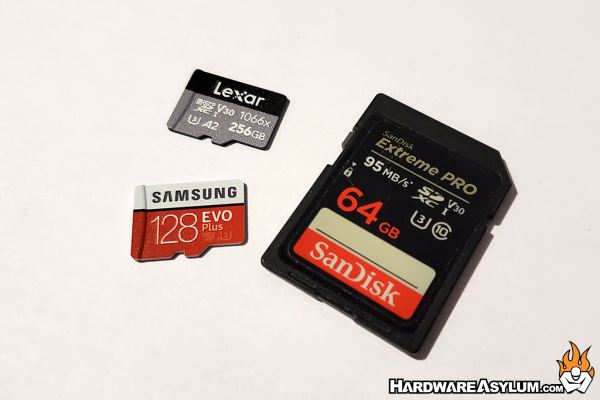Lexar Professional 1066x microSDXC SILVER Series Card Review
Author: Dennis GarciaBenchmarks
EVGA Z490 FTW – Z490 Chipset
Intel Core i5 10600k (4.1Ghz) Hex Core 6 x 32KB L2 Cache 6 x 256KB L3 Cache 12MB
Cooler Master ML360 Sub-Zero
1x nVidia GTX 1050 Ti
2x Patriot Viper Blackout Edition PC4-34100 16GB DDR4 (19-21-21-41)
Crucial MX500 500GB SSD
HP dvd1260i Multiformat 24x Writer
Thermaltake Toughpower Grand 1050 Watt PSU
Windows 10 Pro 64bit
Storage Tested
Lexar Professional 1066x microSDXC 256GB
Reference Storage
Samsung EVO Plus microSDXC 128GB
SanDisk Extreme PRO SD 64GB

For the benchmarks I have chosen to offer synthetic benchmark results that are repeatable and should provide a good basis for comparison. For an interface I used the Lexar USB 3.1 card reader plugged into a USB 3.2 port on the motherboard. While it would be fun to run PCMark 10 on SD cards it wouldn't offer a realistic result so, we will be sticking to the traditional transfer benchmarks.
Sandra is a software collection of synthetic benchmarks that will give us a basic idea as to what a system is capable of. It should be noted that SiSoft numbers can change depending on what hardware is being tested. These were recorded using Sandra Professional Version 30.27.2020.1

ATTO Disk Benchmark is a freeware disk benchmarking utility that can test a variety of storage solutions from single hard drives to multi-level RAID arrays and solid-state disks. The tests can be broken down to transfer sizes between 512B to 64MB with lengths between 64KB and 32GB. Testing results are shown on a transfer chart with reads and writes clearly marked.
For our benchmark the 64MB transfer is being recorded even though the 128k range is often quoted as having the fastest transfer speed (range) of any drive.
I am going to include the benchmarks result below that show that after 64KB the drive tops out and transfers at full speed matching what is reported in the other synthetic tests.


Crystal Disk Mark is a widely available disk benchmarking program that can test a variety of different scenarios from Sequential to Random with Multiple and Single queues.
For our tests the Sequential and Random test with multiple queues and threads will be recorded.


External SSD performance depends on a number of factors including cable length, USB chipset and even the type of processor you are using. The Lexar Professional 1066x is extremely fast not only as a microSDXC card but also as a UHS-1 Class card that has typically been limited by the specification. Both of the reference cards illustrate this and show that the manufacturer was simply following the specification instead of taking advantage of it.
As with any storage device there is some overhead in processing the data. Despite this I am surprised to see that Sequential reads and writes are almost dead on when it comes to reporting their transfer rate however when we get to the random writes the drives slow down considerably. This goes back to the ATTO screenshot showing that only 64KB files and larger have been optimized for this flash storage medium.

